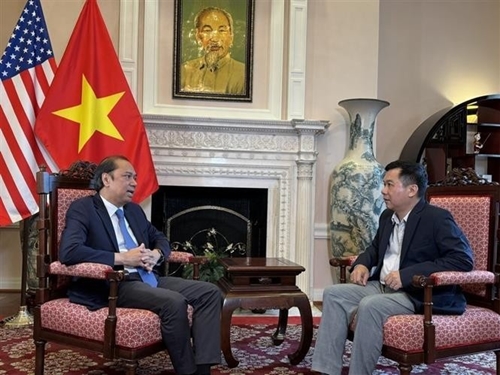In an interview with the Vietnam News Agency (VNA)'s resident correspondents in Washington D.C on the occasion of the 30th anniversary of the normalization of Vietnam - U.S. relations, Dung described the past 30 years as a highly meaningful chapter in the bilateral ties, marking an extraordinary transformation from former adversaries after the war into comprehensive strategic partners.
    |
 |
|
Ambassador Nguyen Quoc Dung (left) talks to a Vietnam News Agency correspondent in Washington. |
Such a journey is rare in international relations, and for Vietnam, it represents the fruit of a consistent foreign policy of independence, self-reliance, multilateralization, and deep global integration for peace and development, he said.
The ambassador highlighted four key factors behind the progress in the Vietnam - U.S. relations. First and foremost is the vision and political determination of leaders of both countries. Second is the principle of mutual respect, particularly respect for each other's independence, sovereignty, and political regimes. The third factor is the joint effort to address war aftermath, such as dioxin decontamination, bomb and mine clearance, support for Agent Orange/dioxin victims, and search for personnel missing in action, which are activities with profound humane significance.
Lastly, he pointed to economic and trade cooperation as a major driving force, with bilateral trade having increased more than 200-fold since 1995. This growth has made Vietnam one of the U.S.’s leading partners in the Association of Southeast Asian Nations (ASEAN).
Looking ahead, Dung said in the context of rapid changes in the world and regional situation, the Vietnam - U.S. relationship has maintained stability and positive development momentum, showing that this is a relationship with strategic depth, mutual complementarity, adaptability and practical benefits for both sides.
He outlined several priority areas for future cooperation such as trade and investment, with a focus placed on high technology, supply chains, hi-tech agriculture, and digital transformation. Vietnam wants to become a trusted partner of the U.S. in global supply chains, Dung stressed.
According to the ambassador, cooperation in science, technology, and innovation is a new highlight, especially in semiconductors, artificial intelligence, clean energy, and health care. Additionally, both countries are expected to strengthen ties in education and high-quality workforce training, defense and security, people-to-people exchanges, and continued efforts to overcome war consequences. These areas were clearly identified by both sides when the relationship was elevated to a comprehensive strategic partnership in September 2023.
Reflecting on the past three decades, Dung said Vietnam and the U.S. have come a long way, building a special relationship – not only because of history, but because of how both countries have transcended history to look to the future. He expressed his confidence that the relationship would be elevated to a new height, not only in the breadth of cooperation, but also in the depth of mutual understanding and trust.
The diplomat underscored the importance of building a strong social foundation for the bilateral relationship, where people especially younger generations, can deepen their mutual understanding, learn from each another, and contribute to creating shared values.
He expressed his hope that the U.S. will continue to go along with Vietnam – not only as comprehensive strategic partners, but also as sincere friends who share the same aspirations for a peaceful, stable and inclusive world. Vietnam will continue to be a reliable and responsible partner, working with the U.S. to create a better future for the region and the world, the ambassador stressed.
Source: VNA